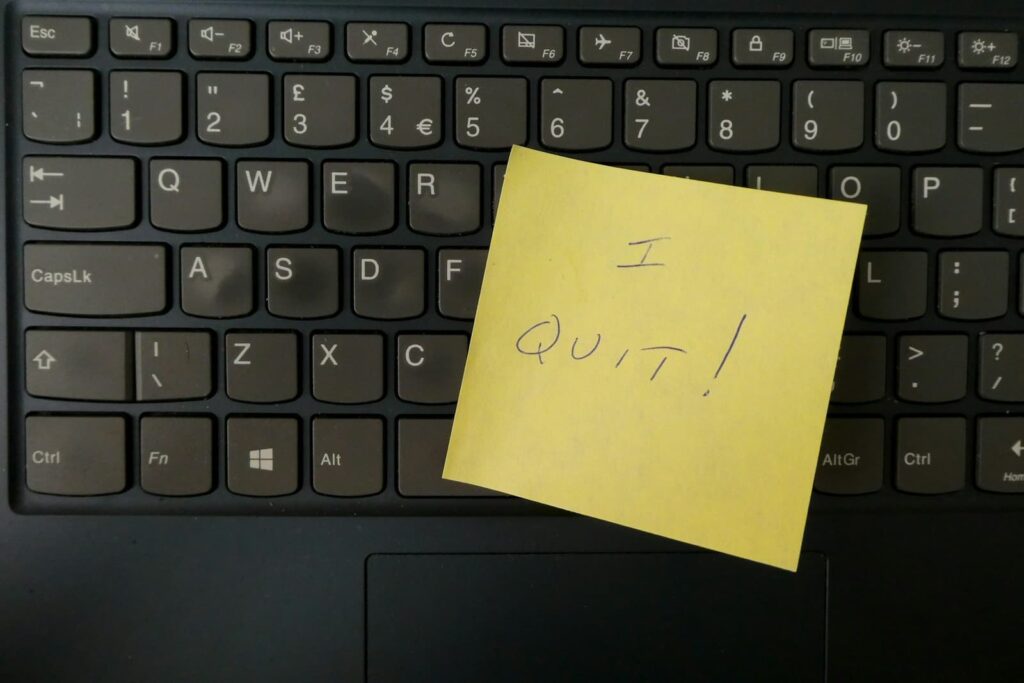Knowing When to Quit: Don’t Let Fear Keep You Stuck

Knowing when to quit is one of the hardest decisions we face, yet it’s often the key to a more fulfilling life. Goli Kalkhoran, a lawyer-turned-entrepreneur and host of the Lessons from a Quitter podcast, knows this firsthand.
After leaving law, she built a business helping others navigate career transitions. In this post, she shares how to recognize when it’s time to quit and develop your mindset to move forward with confidence.
Knowing when to quit: The signs

It can feel confusing when you’re deciding to walk away from a major part of your life. As you read on, check in with yourself – does this resonate?
Quitting feels scary but staying feels worse
Many people hesitate to quit because they assume it’s easier for others than it would be for them. The truth is, quitting can feel terrifying for anyone.
It brings up fear, regret, self-doubt, and even a loss of identity. Without a clear plan, it can be disorienting, making you question whether leaving is the right choice.
But as you weigh the pros and cons of your decision, you may begin to see that quitting is the answer even when it’s the scarier choice.
Choosing your hard
Staying in a situation that’s wrong for you is just as hard, if not harder, than quitting. If you already know your current situation isn’t working, why not move toward the possibility of something better?
It’s natural to crave immediate success to prove to yourself (and others) that you made the right choice, but the reality is that transitioning takes time.
Growth happens in the uncertainty, and sometimes, the best thing you can do is trust the process and keep going.
Do you find yourself really wanting to quit, but talking yourself into staying simply because a successful outcome isn’t guaranteed?
Recognize that the only way to know what happens next, is to take the first step toward a new possibility.
Mistaking comfort for happiness
One of the biggest mental traps we fall into is mistaking comfort for happiness. We stay in the familiar, even when it makes us miserable, because it feels safer than the unknown.
But ask yourself—what’s the alternative? Staying stuck and feeling unfulfilled? Once quitting is on your mind, you’ve already outgrown where you are. The only real option is to move forward.
How to quit your job & anything that’s not serving you
The biggest obstacle in the face of quitting what is no longer for you, is your own mindset. Here’s some advice to navigating through:
Shift your mindset first
The journey of quitting starts with shifting your mindset. Instead of viewing quitting as failure, reframe it as an opportunity to build trust in yourself.
Certain thoughts can be a saving grace during this transition, like viewing life as a puzzle that you’ll figure out piece by piece, instead of pressuring yourself to have all the answers already.
The doubt will always be there, but it’s better than the certainty of staying in a situation that no longer serves you.
Consider your future self
Think about your future self. Five or ten years from now, you’ll likely wish you had left sooner. The longer you stay, the more stuck you may feel over time.
The person you become through the process of quitting, exploring and rebuilding is worth it. You’ll gain self-trust, confidence and resilience that will carry you forward through whatever comes up ahead.

Work on yourself first
If quitting isn’t urgent, start with small mindset shifts and some self evaluation. Avoid jumping from job to job just to escape discomfort.
Instead, take time to understand what’s truly misaligned for you and work toward intentional change.
Wherever you go, your mindset follows, so focus on cultivating self-awareness and internal growth even before making an external move.
Overcome the need for external validation
One of the biggest barriers to quitting is the need for external validation. Many of our self-sabotaging behaviors stem from seeking approval from others.
True confidence comes from self-trust – knowing you have your own back, no matter what. When you build that foundation, the opinions of others hold less power over your decisions.
Remember not to value others’ opinions (imagined or real) above your own when it comes to decision-making. It’s you who has to live with your decisions everyday, no one else.
Rewire negative thinking
Be intentional about rewiring your thoughts. Our brains have a natural negativity bias, so practice positive self-talk that feels believable to you.
Over time, this rewiring helps reinforce the belief that you are capable of navigating change.

Beware of the sunk cost fallacy!
Another major mental trap is the sunk cost fallacy: the tendency to stay in something simply because you’ve already invested time, money or effort into it.
Think of it like a bad movie: if you’ve already spent an hour watching and it’s terrible, do you sit through the rest just because you paid for the ticket? Most of us do, even though leaving would save us time and frustration.
The same applies to careers, relationships and commitments that no longer serve us. Staying for the sake of what you’ve already invested only wastes more of your future.
Embrace uncertainty
The biggest disservice we do to ourselves is believing that quitting is inherently bad. In reality, quitting is often the most courageous step toward a life that aligns with who we are now.
It’s not about chasing happiness, it’s about learning to tolerate uncertainty. Don’t let the fear of the unknown keep you in a place that no longer fits.
Familiarity doesn’t equal happiness, and certainty doesn’t guarantee fulfillment. If you already know where you are isn’t right, it’s time to take the leap toward something better.
Listen to the episode: Lessons From a Quitter
Goli Kalkhoran is lawyer-turned-entrepreneur, which is a fancy way of saying she quit law, tried a bunch of things, and happened upon an idea that she turned into a business.
She is the host of the Lessons from a Quitter podcast where she uses her platform to de-stigmatize quitting and provide resources and inspiration to individuals looking to pivot in their established careers.
She challenges people to exceed their own expectations and guides them through the initial steps of starting over in order to build a more intentional, fulfilling life.
In this interview we discuss:
- The benefits of quitting what’s no longer for you, including how quitting can aid identity discovery
- How to know when you need an internal mindset shift vs to change your external circumstances
- The biggest limiting belief that causes self sabotage
- How negativity bias hinders self confidence
- How sunk cost fallacy may be keeping you stuck
- Ways to shift from a negative mindset to a healthy mindset